Peter MALONE
Synchronic
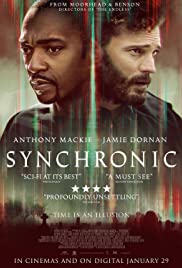
SYNCHRONIC
US, 2019, 102 minutes, Colour.
Anthony Mackie, Jamie Dornan, Katie Aselton, Ally Ioannides, Ramiz Monsefl
Directed by Justin Benson, Aaron Morehead.
Synchronic is actually the name of a highly powerful, deadly drug. It requires a detailed chemical process, the ‘syn’ of its name, synthetic. However, there is also the allusion to ‘chronos’, the Greek word for time. Synchronic has a time-travelling effect.
This is science fiction. It is futuristic science-fiction.
There are two paramedics, played by Anthony Mackie and Jamie Dornan. They are experiencing difficult times in their work, tending victims of synchronic. Mackie is Steve, but suffering from a terminal illness which he doesn’t let on to Dennis, Jamie Dornan. Dennis is having marital problems. And his daughter disappears – with the synchronic connection.
The main feature of the science fiction is that when anyone takes the drug, they disappear. And the novelty of the screenplay is that they disappear into the past. Steve has been confronted by the creator of synchronic, who is going around the country buying back the drugs. Steve has five tablets and decides not only not to destroy them but to try them out.
In the further novelty of the disappearance into the past is that the taker is transported into that very spot – and in a variety of pasts, back into the ice age, back into the era of the Conquistadors, the 1812 war with Britain…
And the drama of the action then is Steve’s decision to go to where Dennis’s daughter disappeared, to take a tablet, to take one into the past for her, getting her back. And, this leads to some dangerous action, confrontations, split-second timing and rescue. But, what about Steve?
The writers-directors, Justin Benson and Aaron Morehead, made a tantalising science fiction, endless. This one is not so tantalising, but it is imaginative.
1. The science fiction, futuristic fiction? Human interactions?
2. The title, the production of synthetic drugs, the makers, the customers, the effects? Synchronic and its inventor, his wanting to buy again all the sales? Steve denying, keeping the drugs? The audience seeing the couple at the opening, in the bedroom, together, the drugs, the special effects for the effect, destruction?
3. Steve and Dennis, paramedics, their work together, previous ambitions, their friendship? Dennis and his marriage, his daughter?
4. Their work, those affected by the drugs, the unsafe areas in New Orleans, the violence, the effect of the drugs? The discovery of the body of the dead drug maker?
5. Dennis, his relationship with his wife, with his daughter, drugs, her disappearance? Dennis calm, his wife upset, his sitting and typing? His search? Going back into himself, explaining his tensions with his wife to Steve?
6. Steve, the medical examination, terminal illness? The consequences? With the drugs? His decision to take them?
7. Steve, the video, his talking to Denis, visualising his taking the drugs, his disappearance, the time passing, his reappearance?
8. The range of locations, moving to different places in the room, the year of the Spanish conquerors, the ice age, the mysterious religious characters? The war of 1812? The visualising of these episodes and the effect on Steve, fear, the cold, getting back on time?
9. Steve and Dennis talking, the revelation about his illness, the effect on Dennis? His wanting his daughter?
10. The few remaining pills, Steve finding out where Brianna disappeared, his taking the pills, the war, the bombardment, escaping, encountering Brianna, the approach of the soldier, his attitude towards the black man, slave? The rescue, the position, her taking the pill, her return?
11. Dennis, Steve’s disappearance, Brianna’s appearance, Steve and his mysterious final appearance, vanishing? Self-sacrifice?
12. For fans of science fiction, fantasy?
Turning, The/ 2020
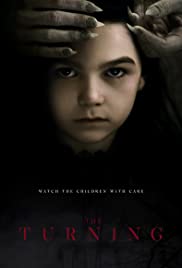
THE TURNING
US, 2020, 94 minutes, Colour.
Mackenzie Davis, Finn Wolfhard, Brooklynn Prince, Barbara Marten, Joely Richardson.
Directed by Floria Sigismondi.
Henry James’ The Turn of the Screw is considered a classic ghost story. It was filmed in the early 1960s by Jack Clayton as The Innocents with Deborah Kerr striking as the governess. There was a version in 1974 for television and another in 2009. There was also a speculative recreation of the characters in the 1970s with The Nightcomers, starring Marlon Brando.
Here the narrative is made contemporary while keeping the key elements of James’ narrative.
This time the governess is Kate, played by Mackenzie Davis, a teacher, taking up employment in tutoring two children in an old mansion. The little girl, Flora, is quite vivacious. The boy, played by Finn Wolfhard, is a dark sinister look, has been expelled from his school for violence, behaves erratically, trying to dominate the new governess. Also in the household is an extremely severe housekeeper, Mrs Grose (Barbara Marten). The children’s guardian is away.
The treatment of the story is contemporary Gothic, especially with the house, the grounds and the forbidding gate, a lake. While Kate wants to take the children out, the housekeeper forbids it, Flora stating that she does not want to die. All the time there is the pervading influence of the previous governess, Miss Jessel, who mysteriously left (although the audience has seen her attempts to escape and her death in the prologue to the film). There is also the ominous presence of the dead gardener, Peter Quint. There is a mystery of his relationship with Miss Jessel.
The film depends on darkness in the house, the mysterious grounds, and Kate’s having a range of nightmares as well as ghostly experiences.
The ending seems particularly mysterious, real or unreal? Perhaps it is better to go back to the earlier versions.
1. The status of Henry James novel? The various screen interpretations, The Innocents, The Nightcomers, The Turn of the Screw in 1974, 2009. This updating?
2. The adaptation, the 21st-century? Characters, styles, costumes and decor? Contemporary? The musical score?
3. The introduction, Miss Jessel, her terror, the house, the attempted escape, the gates, the car, her death?
4. Kate, her life and style, roommate, her work, education, the invitation to the house, travelling, contacting the remake, the later phone calls?
5. The situation the house, the children, the absent Guardian, Flora and her age, playful little girl, Miles, his age, at boarding school, his appearance and look, the touch of the sinister? The presence of Mrs Grose? Severe in manner and speech? The hothouse atmosphere? The mansion, the grounds, the lake?
6. The touches of the contemporary, the town, car, the glimpses of the outside world?
7. Mrs Grose, her manner, in the family, her severity, forbidding Flora to leave, the reprimands to Kate? The buildup to her interventions, the clashes, confrontation, her death? The story of Peter Quint, his presence in the house, the influence on miles, his work, the relationship with Miss Jessel, her vanishing?
8. Kate, the tutoring, the classes, befriending Flora, her serious face, wanting her to go out, Flora fearing death? The play, the outings?
9. Miles, expelled from school, the bullying? His age, his appearance, his reactions, playing the drums, the rooms and his appearing, reprimanding Kate, the harshness?
10. The mystery, the touches of horror in the house?
11. Kate, her dreams, the nightmares, the lake, the body of Miss Jessel, the sinister influence of Quint? Sleeping and waking? The intimations of Quint’s presence in the house?
12. Gathering the children, Mrs Grose’s death, the presence of Quint, her wanting the escape? The drive, the gate? The reality and unreality of the ending?
Tu Me Manques
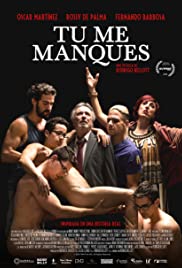
TU ME MANQUES
Bolivia, 2019, 110 minutes, Colour.
Fernando Borbosa, Oscar Martinez, José Duran, Rossi De Palma.
Directed by Rodrigo Bellott.
The Spanish title is translated into English, I Miss You. However, as the screenplay comments on the Spanish title, it is far more telling, that, in your absence, something is lacking, something is missing in me.
The film was written and directed by distinguished Bolivian film-maker, Rodrigo Bellott. He has made several short films as well as features, most of them with an emphasis on sexuality, and homosexuality. And this is the case here.
The film opens aggressively, a harsh phone call between a bereft father lamenting the death of his son and his attack on the son’s lover. This leads to quite a number of flashbacks, a series of different flashbacks, leading to a kind of mosaic in the narrative. It also concerns the writing of a play, auditioning the cast, rehearsals and performance.
On the linear level, the film shows the lover, Sebastien, living in New York City. The father, Jorge, comes to New York from Bolivia to try to understand his son and what happened to him, especially leading to his suicide. Sebastien is unwilling. The father collapses, moves to a hotel. However, he approaches Sebastien, asking him to take him around the gay community, meeting a number of friends, going to a club with its music and dancing and sexual atmosphere. In the meantime, Sebastien has flashbacks to his first meeting with the son, Gabriel, taking him to a flamboyant party, their living together, their loving relationship. And there are flashbacks to the pressure from Bolivia, Gabriel’s domination by his father, the decision to return home, his stopping in Miami to talk to his sister, his killing himself.
Sebastien’s way of coping with his grief is to write his play. He decides that there should be 30 actors on stage representing Gabriel. There are auditions, quite a wide range of men with their ambitions as well as their sexual struggles, some powerful rehearsals, getting the men to experience some deep emotional relationships, the performance of the play, leading to an actor naked, all miming the fall-suicide, and then their lifting up the dead man, a kind of Pieta.
What makes the film different is that the father then becomes part of the performance, challenging the actors, interacting, sharing the grief.
In this way, the film becomes a powerful cinematic instrument that could be effective in opening up questions and attitudes, of families, and, especially, of fathers.
During the final credits there are some glimpses of the performance of the play in Bolivia, with the cast, and the father.
1. The work of the writer-director, in Bolivia, in the United States? Films, theatre, film and theatrical education?
2. Issues of sexuality, sexual orientation, homophobia, gay communities, issues of coming out, parental disapproval? In the context of Bolivian society in the 21st-century? The film’s director and his play, this film version, and the influence on changing Bolivian attitudes?
3. The play within the film, a play as a means of memorialising a person, of exploring their personality, their challenges and struggles, as a means of illustrating to parents, especially fathers, the reality of homosexual orientation?
4. The structure of the film, the initial phone call, the confrontation between Sebastien and Gabriel’s father, the consequences, his going to New York, seeking out Sebastien, involvement with the play and with the gay community? The insertion of the flashbacks of the relationship between Sebastien and Gabriel? Insertion of flashbacks concerning Gabriel, his father, the visit to his sister, his suicide? The insertion of the issues of the play, persuading the producer, auditioning the cast, rehearsals? And the interview by the journalist of Sebastien and Sebastien’s perspectives?
5. Sebastien,from Bolivia, in New York, the first encounter with Gabriel, buying the shirt, sartorial advice, inviting him to the party, the kiss, their being together, living together, their life together? The atmosphere and behaviour at the gay party? The tension for Gabriel about his father and expectations? Sebastien having to let him go, Gabriel’s visit to Miami and his sister? The promise erase the photos from social media? His not doing so?
6. Sebastien, the encounter with Gabriel’s father, the animosity of the phone call? The father and his coming to New York, coming to the apartment, Sebastien’s hostility, the father’s collapse, the gay friend and his kindness, treating the father, taking him to the hotel?
7. The father, theatrical background, Hispanic patriarchy, his wife being ill, Gabriel as his only son, not wanting to admit the truth, Gabriel leaving Bolivia, the plan for the return, the news of his suicide, the luggage coming home, then his body? The animosity of the phone call to Sebastien? His going to New York, the trip, physical health, collapse? His going back to Sebastien, wanting to understand his son, Sebastien taking him on the tour of the gay community, the flamboyant friend and his advice at the cafe, the presumption that the older man was gay, looking for contacts, the various visits, personalities, going to the gay club, the dancing, the sexual atmosphere? The conversations and discussions with the gay men? The impact on the father?
8. The visit to Rosaura, her encouraging Gabriel and Sebastian, adopting them, her taking the father to the artist, the visuals of the naked subjects, the discussion about Gabriel?
9. Sebastian writing the play, becoming more involved, the discussions with the producer and getting the money, to find 30 Gabriels, the range of auditions, the personalities, the stories, need for work, sexual issues, the young actor eventually being bashed but yet performing? The rehearsals, the demands, Sebastien and his associates, alert, wanting the couples to embrace, to relive an intense emotional performance, the even more intense effect on the actors?
10. The performance of the play, the 30 Gabriels, the costume, the performance, the audience response? The participation of the father, his involvement, with his son, the miming and the father’s confrontation, the son, stripping, naked, the miming of his falling from the airport tower, his death, the actors lifting him up, holding him, his father, a kind of Pieta?
11. Sebastien and the interview with the journalist, an opportunity to reflect on what it happened?
12. The play performed in Bolivia, its impact, its confronting homophobia and legislation?
Finding Steve McQueen

FINDING STEVE McQUEEN
US, 2019, 91 minutes, Colour.
Travis Kimmel, Rachael Taylor, Forest Whitaker, William Fichtner, Louis Lombardi.
Directed by Mark Steven Johnson.
Film buffs will be alerted to the title, their memories of an admiration for actor, Steve McQueen. The emphasis in this film is on his role in 1968’s Bullitt (posters seen throughout the film).
The reason for the title is that the central character, Harry John Baker, played with blue-eyed ingenuousness by Travis Fimmel, has a passion for Steve Mc Queen, signing any business deals, bookings, taxis, with the name, Steve Mc Queen.
In 90 minutes, there are three stories intertwined, a straightforward narrative where Harry sits in the diner, eating deserts, explaining to his girlfriend, Molly Murphy, Rachael Taylor, the truth about his life and his past. Which provides the occasion for quite a number of flashbacks.
First of all, there is the planning of a burglary in California by a group of friends in Youngstown, Ohio, led by the uncle, played by William Fictner. They are reality group, going to California to rob a bank where they know that there are millions of dollars deposited in secret funds by Richard Nixon. This is the late 1960s, early 1970s – and with references to films including Bonnie and Clyde and The Godfather.
And there are flashbacks to the robbery, well-planned in getting into the bank, the contents not being exactly what was hoped for.
Another story is that of the FBI pursuing the robbers, especially in the form of an agent played by Forest Whitaker. FBI authorities from DC also appear, including W Mark Felt, indicating his own investigations into the Watergate burglaries (with references, images on television, articles by Woodward and Bernstein), who later was revealed as Deep Throat.
And then, there are the flashbacks to Harry escaping from arrest, breaking down in the country town, staying there, encountering Molly, falling in love, respected in the town, and her father the sheriff.
It emerges that Harry has informed the sheriff of who he is and that the FBI will be coming to arrest him after he has confessed to Molly.
Very little violence in the film although one of the criminals threatens to shoot the police. Rather, there is an atmosphere of general niceness about the proceedings. And, interestingly, the two central American characters are played by Australians, one from Echuca, the other from Tasmania!
1. Title? Arresting? Audience knowledge of Steve Mc Queen? His status, his career, his death at 50 in 1980? Screen persona, especially in Bullitt? References to the getaway? Bullet posters? Harry identifying with Mc Queen, using his name for purchases?
2. The period, the late 60s, the early 70s, the late 70s? Youngstown Ohio, workplaces, homes? California, the bank, the beach situation, the rental house, the burglary? The FBI, on the road, offices? The small town, the streets, homes, picnics, the Vogue cinema, the diner?
3. The importance of the musical score, the wide range of songs from the late 60s, through the 70s, the background to characters and plot?
4. The structure of the screenplay, the conversation between Harry and Molly in the diner? The flashbacks to Youngstown, the preparation for the burglary? The flashbacks to going to California, the house, surveillance, the various flashbacks to the robbery itself? The story of the FBI and the pursuit? The aftermath of the burglary, everybody going home, back to Youngstown and eventual arrest? Harry and his brother, the background of Vietnam, the brother taken into custody? Harry driving, breaking down in the town, getting the job, staying there, his relationship with Molly? His finally telling her the truth?
5. Harry telling Molly the truth, her disbelief, his going over the story, his own perspective, a touch wide-eyed when he was young, driving, stealing cars, reckless chases with the police, but shrewd, knowing how to stop the battery, stealing it, torching the car? Participation in the robbery, his uncle relying on him?
6. The uncle, robberies, his skill in mending machines, clock? His vocabulary – and Harry not quite understanding? The other members of the group, Paulie, at home, tough and gruff? Tommy and the experience of Vietnam, at the factory? Ray, slick, professional criminal? The plan to rob the bank?
7. The anti-Nixon screenplay? The uncle and his powerful rant against Nixon, crook, Vietnam, war atrocities…? The deposit in the bank, unable to be traced? The irony of the deposits by Colson, his baseball card book, yet the address for Cayman Islands offshore accounts?
8. The visit to California, so different from Ohio, the beach and the palms, the luxuries house, the hot tub?
9. The plan for the burglary, the several visits to the bank, the group carrying the ladder, the plan, the alarm, the explosives, the boxes, the contents? The frustration of the contents?
10. The FBI, Lambert, at work locally, the Washington agents arriving, W Mark Felt, his role, secrecy, (and his being Woodward and Bernstein’s contact, Deep Throat, his referring Howard to the article, promoting Howard to DC)? Howard and his assistant, awkward, encouraging her, the research, the information about Colson, Howard persevering over the
years, tracking down Harry, the arrest in the street?
11. Harry, his life in the town, Molly, tough, Bonnie and Clyde, romanticising criminals, the bond with Harry, meeting her parents, her father the sheriff, Harry with the kids at the picnic, working at the bar, his happy life? Molly, his confession, her make up like Debbie Harry, disbelief, listening, not wanting him to go, saying she would wait?
12. A quiet blend of burglary, FBI investigation, romance?
Gates of Paradise/ VC Andrews Gates of Paradise
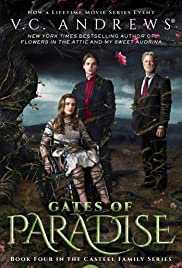
GATES OF PARADISE/ VC ANDREWS GATES OF PARADISE
US, 2019, 88 minutes, Colour.
Lucy Boys, Jason Priestley, Johanna Newmarch, Jason Cermak, Pauline Egan, Michael Karl Richards, Ben Sullivan, Keenan Tracy, Daphne Zuniga.
Directed by Gail Harvey.
This is the fourth film in the series focusing on the central character, Heaven. VC Andrews died but Andrew Neiderman took over and published many novels with her name. However, Heaven and her husband Logan are killed in a car accident in this story and attention goes to their daughter, Annie, also the subject of the fifth novel, film in the series, Web of Dreams.
18 years have passed since the last story, Fallen Hearts. Annie is born at the end of that film. Now she is turning 18. In the last film there was a reconciliation between Heaven and her rather promiscuous sister, Fanny, and the complications of Fanny’s son, Luke. By this stage, family seem to be getting on well enough, Fanny still taunting Heaven, being provocative in flirting with Logan. In fact, this is disastrous when Fanny invites Logan to dance during Annie’s birthday party, Heaven upset, dragging Logan away, his reckless driving, drunk, the car crash. And Annie surviving, time in hospital, and her not being able to walk.
From the past stories there is also the young Drake, son of Heaven’s putative father, Luke. There is also Luke, son of Fanny, and a complication from the previous story of Logan’s one night stand with Fanny. By now, Annie is very much devoted to Luke who goes off to study medicine.
With the death of her parents, Annie is visited by Tony Taterton, again played, perhaps a little less stolidly, by Jason Priestley. And once more, he intervenes, seeing Heaven and her mother in Annie. He transfers to her to the ancestral home, looks after her every need but virtually imprisons her, no phone connection or outreach. He is obsessed as he has been throughout.
Standout is the guest performance by Daphne Zuniga as the supervising nurse, vicious in her treatment of Annie, yet able to be smiling and charm in in her encounters with Drake.
Annie eventually contrives to get out of her room, meets Troy, finds that the model house that her mother had given her for her birthday is Troy’s house. Eventually it emerges that Heaven had spent the night with Troly – and that he is her father! There is a confrontation with Tony, his collapse, death. Luke is allowed back – and Annie reveals that Troy is her father and so they are not blood related… And on to the next episode.
Let Them All Talk

LET THEM ALL TALK
US, 2020, 113 minutes, Colour.
Meryl Streep, Dianne Wiest, Candice Bergen, Lucas Hedges, Gemma Chan, Fred Hechinger, John Douglas Thompson, Daniel Algrant,
Directed by Steven Soderberg.
If one was writing a review with a cynical touch, the comment would be that it would be better not to let them all talk. They all talk too much.
This is a Steven Soderberg film, 30 years after he made such an impact at the Cannes Film Festival, 1989, with his award-winning, Sex, Lies and Videotape. He had a mixed career during the 1990s, some successes, experimentation, especially with Kafka. However, in 2000, he directed both Erin Brockovich and Traffic, Julia Roberts winning an Oscar, Soderberg himself winning an Oscar for Best Director for traffic.
During the 2000s, he again experimented with all kinds of genres, especially with his all-star cast and popularity of the Oceans films, as well as his portrait of Che Guevara.
During the next decade, he continued this varied career, some film for cinema, some films for television, including this one.
The premise is basic, a successful author, unable to finish her latest novel, decides to accept an invitation for an award in England, is persuaded by the agent to go by ship, invites to her very old friends that she has not seen for years to accompany her. She is also accompanied by her nephew who serves as a companion and confidant.
And, the author is played by Meryl Streep, giving yet another varied performance (after working for Soderberg in Laundromat). This time she is a grand dame, sweeping around the ship, swimming, her meals, the conversation with her friends. Dianne Wiest, a psychologist working with condemned prisoners, tries to be a mediating friend. And this is the need because the other friend, the hairdresser played by Candice Bergen, has bitter memories of the author who took over her life story, exposing her, leading to a divorce and decades of embitterment. Lucas Hedges, so effective in many films, seems a rather callow choice for his aunt to take as confidential companion. On the voyage, he teams up with the agent whom his aunt looks down on, played by Gemma Chan.
There are various episodes on the boat, swimming, afternoon teas, socials, the hairdresser especially enjoying all the aspects of the sea voyage. But, it has to lead up to a confrontation, arrival in England and going to the scene of the award, a visit to the grave of the author in whose honour the award is made. Then, a lot of truths are told – and a final reason given for the author wanting to put her life in some kind of final order.
To be seen more for the cast and their performances rather than the plot, development of the narrative, and all the talk.
1. The title? The characters and their attitudes about people, about talking? A talking picture, relying on dialogue?
2. The screenplay, written, improvised? Exclamations, halting, silences? The dramatic effect? Credible dialogue or contrived?
3. The premise, the celebrated author, her friends in the past, the award, persuaded to cross the Atlantic on the Queen Mary, inviting her friends, the voyage, interactions?
4. The introduction to the central characters? Alice, age, career, novels, personal manner, the discussions with Karen, changing agents, prospects? Susan in Seattle, conversations, her work on the parole board? Roberta, Dallas, the lingerie shop, age, experience, casual, the argument with the client about colour, her boss? Tyler, Cleveland, his friends, modern and not knowing the past, Alice’s nephew?
5. The Queen Mary, everybody going on board, the staterooms, the staff, their courtesy, the sequences interspersed about the staff, cooking, preparing meals, laundry…?
6. The meetings, the three women, after 30 years? Alice and her superior manner? Intending to write on board, her routines, breakfast with Tyler, writing, swimming, meetings, meals? Susan and her enjoying the trip, Roberta and her going to the functions, dressing up?
7. Karen, approaching Tyler, wanting information about the progress of the manuscript, the friendship, the various sequences together, dating, Karen telling her story about her relationships, Tyler and his age, response, the attraction, asking could he kiss her, her not answering? His explanation of this episode to Alice?
8. Alice wanting Tyler to look after the women, keep them entertained, her sense of obligation towards them? The ordinary friendship with Susan? Roberta and her reaction, her story told in the novel, the repercussions on her husband, the breakup of her marriage, divorce? Her bitterness?
9. Roberta, the issue of money, the man with the fortune, his ignoring her, Google research with Tyler? Her resentments, the discussions with Susan?
10. Alice and her talk on board, the issue of using people’s lives for her novels? Yet her explaining that the novels were herself? The final talk with the Roberta, Roberta’s resentment, wanting an apology, then switching to the issue of money, royalties? Alice prepared to write a cheque?
11. The mystery of the man in Alice’s room? Reading at the swimming pool and encouraging her? Alice’s death, Tyler’s shock? The mysterious man as the doctor and his explanations?
12. In England, the accommodation, comfortable? The impact of Alice’s death? The decision to go to the grave of the author? Tyler and his solemnity?
13. Roberta, taking the manuscript, contacting Karen, suggesting publication, or online?
14. Susan, the encounter on the ship with the murder mystery writer, Alice and her disdain, yet reading his book, writing, the conversation with him about how he wrote? Susan making friends, working with him to supply plot details?
15. A talkative portrait of the older women and those with whom they came in contact?
Last Picture Show in Bucharest, The
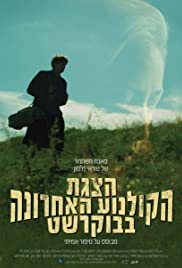
THE LAST PICTURE SHOW IN BUCHAREST
Israel/Ukraine, 2019, 78 minutes, Colour.
Paul Octavian Dionescu, Eitan Anner, Cristin Balint, Julia Levy- Boeken
Directed by Ludi Boeken.
With such a title and the sequences in cinema in Bucharest, 1940s, the German invasion, the behaviour of the local fascist police, the persecution of the Jews, roundups, shootings in the forest, there is a tension between the movies and reality.
And, throughout the film, there are movie references, especially through trailers, The Maltese Falcon, Passage to Marseille and, when the central character joins the Foreign Legion, Casablanca.
And the central character is a young man, son of the owner of the movie theatre, seeing his father killed, a roustabout with other young men in Bucharest, befriending a young woman who is attacked, rounded up and sent to a juvenile camp. And he is transferred to Israel.
The film shows the life of refugees in Israel in the 1940s, in camps in tents, difficulties with language, some harsh treatment. However, he once again encounters the girl from Bucharest who helps him.
His story is something of a puzzle as the film opens in Indochina in 1954, our hero confronting one of the soldiers and making his escape by boat. The mosaic of the screenplay then fills in the background of the story, the young man and his wanting vengeance on the local Romanian fascist who is responsible for the death of his father, escaping from Israel, travelling with a sympathetic captain on a boat to Italy, making his way to Marseille, joining the Foreign Legion where he tracks down his target. And this involves the war in Indochina, the fascist in charge, getting the young man to follow through on an escape plan.
And, there is the framework of a trial in Israel, the young man being condemned for escape and desertion, a lawyer speaking on his behalf, the young woman and the Italian captain. The case is made for his heroism, the decision of the court, his future.
1. A World War II film memoir? Jews in Romania? Romanian police and persecution of the Jews? War crimes?
2. Romania, the 1940s, German invasion, fascist local police? The persecution of the Jews, shootings in the forest? The cinema, the audience, the trailers for Maltese Falcon? The children, the killings, the attacks, juvenile detention? The musical score?
3. The framework in Israel, Eliahu’s standing trial, the charge, desertion, the judges, the panel? The flashbacks to Eliahu’s life, experiences? The cumulative evidence, the witnesses?
4. Eliahu, the ship to Israel, arriving in Haifa, the refugee camps, the tents, the military training, his escaping, Venice, on foot to Marseille, the foreign Legion, service in Vietnam?
5. The focus on Eliahu, his experiences as a child, the shooting of his father, the death of his mother, his friends, the brutal attack on Louisa, his stabbing the assailant, life in the juvenile detention? Six years? Getting out, the lawyer paying his trip to Israel? Meeting Louisa again, her change of name, her help, the refugees burning their clothes, the appeal to the authorities to charge Stanescu, his obsession? The trailer for Passage to Marseille? Letters to his friend, the location for his enemy? Escaping, the boat, the friendly Italian captain, through the woods, the French border, the offer of the French Legion or imprisonment? Signing up, the interviews, the training, the trailer for Casablanca, the request to go
to Indochina?
6. Indochina, the mission, the dangers, special squads, the news about Ernst, hospital, his return, getting Eliahu to escape, find headquarters, return, the attack and the successful mission?
7. Ernst being wounded, Eliahu carrying him, confronting him, shooting him? The escape in swimming to the boat?
8. Louisa, the bond with Eliahu, in court? The captain and his friendliness, testimony? The work of the lawyer, supporting Eliahu for so many years, defending him?
9. The summing up by the judges, their verdict?
10. A film to add to the enormous range of World War II films, German invasion and attack in Central and Eastern Europe?
Glass Houses
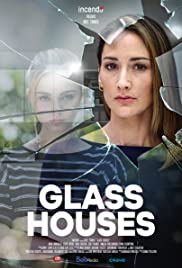
GLASS HOUSES
Canada, 2020, 90 minutes, Colour.
Bree Turner, Aviva Mongillo, Steve Byers, Kyra Guloien, Zoie Palmer.
Directed by Sarah Pelerin.
This is a popular thriller from Canada, the main action taking place in the one street, the carefully manicured elite street, something of a gate community.
The action focuses on a young woman who wants to defend her mother who has been humiliated by the dominating ruler of the street. It involves local politics, the ousting of her mother who now works in a supermarket, the young woman a babysitter for families in the street, planning her revenge.
The film shows the dominant woman, her controlling people, wanting the street to be spick and span, an example to all, critical of some of the other people in the street, demanding on them.
The woman has a tenuous relationship with her husband, their baby, the young woman abducting the baby and ingratiating herself by “finding� it. On the other hand, she tracks down the haughty wife and finds a sordid story background which she exposes – so, people in glass houses, should not throw stones!
1. A popular thriller from Canada? The American settings? Characters? Conflicts?
2. The action confined to the street, suburbia, affluent, the street and facades, interiors? The visit to the motel? The musical score?
3. The title, about people not throwing stones…?
4. The affluent street, Madaline Cooper, snobbish, her relationship with her husband, his business, the young son, her wanting the street to be a gated community, tidying up, her demands?
5. Carrie, teenage, next-door, ordinary, her girlfriend and their conversations? The antipathy towards Madaline, the attack on her mother, the false accusation, losing her job and reputation, her mother working in the supermarket? Carrie and her babysitting to get money for her mother?
6. Vivienne, her husband, daughter, Carrie babysitting, playing in the street, hitting Madaline’s car? Carrie discovering Vivienne and the cocaine?
7. Madaline and her ambitions, for the local council? Discussions with her husband?
8. Carrie, antagonism towards Madaline, babysitting Daniel, going through Madaline’s things, the discovery of the $25,000 check, following in the car, her mother’s poor health and home, the rendezvous at the motel, taking the pictures? The abduction of Daniel, everybody frantic, Carrie and her girlfriend, bringing the boy back? Carrie asking for more money? Madaline’s husband appreciative and wanting Carrie to continue babysitting?
9. Carrie and her mother, her mother wanting to leave things be, calmer in her difficulties?
10. Carrie searching the house, Madaline having it on video? Madaline and her husband’s stepfather visiting, the meal, Carrie seeing his ring, the photo? Sending photos to Madaline?
11. Her husband and his suspicions, confronting his wife, the fact of his stepfather?
12. Madaline, the buildup to the confrontation, electrifying the pool, Carrie’s girlfriend being killed? Madaline’s anger, the meltdown in the street, confronting all those watching?
13. A story of vindictiveness, revenge?
Fallen Hearts/ VC Andrews Fallen Hearts

FALLEN HEARTS/ VC ANDREWS FALLEN HEARTS
US, 2019, 88 minutes, Colour.
Annalise Basso, Jason Priestley, Kelly Rutherford, James Rittinger, Jason Cermak, Jessica Clement, Chris William Martin, Matthew Nelson- Mahood, Todd Thomson.
Directed by Jason Priestley.
This is the third television version of the VC Andrews novel, the third of five, only three filmed, in the series focusing on the character, Heaven. This presupposes audience knowledge of the central characters and their past. It assumes the story of Heaven, her mother and her death, her stepfather, being brought up in the wilds of West Virginia and considered backwoods, her love for a young boy at school, her being adopted out, her affair with her guardian, the discovery of her origins, going back to the rich Boston family, the revelation about who was her father, her affair with his brother… There is also the clash with her wilful and promiscuous sister, Fanny. There is the background of this young woman and her relationship with the Reverend who took in and impregnated her.
The story takes place several years later. Annalise Basso appears once again as Heaven. She is antagonistic towards her seeming grandfather who, in fact, had had a relationship with his wife’s daughter and so is Heaven’s father. His played by Jason Priestley once again, but very stilted performance as before, but Priestley is the director of this film, Paul Shapiro the director of the other two. Once again Kelly Rutherford gives an over-the-top performance as Heaven’s grandmother, this time dying of cancer.
Heaven think she is over the relationship with Troy, her father’s brother, manufacturing the toys which is the industry which supports the family. Now, Heaven marries Logan, who has been in love with her from school days.
As with the other films, credibility is continually stretched, melodramatic event piling on melodramatic event, some over-the-top moments of performance by some of the cast. And, in extreme contrivance, it seems that Troy engineered his own suicide and survived – with a visit to Heaven and her infidelity. She is continually tortured by her younger sister, Fanny, who had had the child by the Reverend focuses on money, taunts Heaven, is pregnant again – and, by contrivance, by Logan.
Extreme complications, Logan admiring Heaven’s father, working for him, the situation of Fanny’s pregnancy, the boyfriend whom she marries, the discovery of the complete manipulation of the family, especially Heaven’s father who was urged to keep away, has married again, has a young son whom Heaven wants to adopt, but whom Fanny abducts. Court proceedings, absolute revelation of everything, $1 million payoff to Fanny, adoption, Heaven giving birth…
Very Ralph
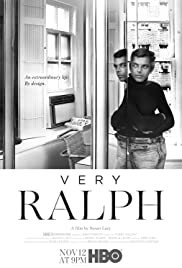
VERY RALPH
US, 2019, 108 minutes, Colour.
Directed by Susan Lacey.
The Ralph for the title is clothing designer, Ralph Lauren.
This is a fairly straightforward documentary about the life and career of Ralph Lauren. Lauren himself has not been a controversial character in his own life and in his business empire, rather different from some of the other notable designers (who have had documentaries as well as feature films or miniseries about them), Christian Dior, Coco Chanel, Yves St Laurent, Giovanni Versace, Alexander McQueen…). This means that there are no real dramatic highlights – which means that a number of viewers have dismissed the film as unexciting or as boring.
However, the film offers an opportunity to see a successful American, and his being paralleled with the other migrants from central Europe and persecutions, the movie directors. In fact, Ralph Lauren was born as Ralph Lifshitz, his brother Jerry later proposing that for a successful business his brothers agree to a change of name. Hence Lauren.
Ralph Lauren had the typical growing up in New York City in the 1940s and 1950s, not well off, but living an ordinary life. Except, in retrospect and in photos, it seems that Ralph had an eye for clothing and style, creating his own personal style. The film also introduces his wife, since 1964, Ricky, as well as their three sons and their daughter, all successful, one a film director, another in the business, and one marrying a daughter of President Bush. More than well-connected.
Ralph Lauren makes it clear that he is not a designer like the classic designers, not doing his own sketches, rather relying on his eye, accuracy, sense of style, and having an effective supporting group around him. However, despite some difficulties early in the business, excess on loans, he remedied the situation – and never looked back.
Because of Lauren’s very American perspective, his clothes and fashions (although he dislikes the word fashion) did not excite the imagination of those who admired the designers from continental Europe. Rather, his style reflected the times as well as going back into American history, Cowboys and boots, for instance. And this changed over the decades, his working up to 2015 in command of the business.
It is a matter of taste how this film audience response to the range of clothes, the behind the scenes and the making and designing, the catwalk performances.
And there is no limit to the number of celebrities who are happy to testify in favour, beginning with a very elegant address by Audrey Hepburn who indicates that Ralph Lauren has become a fashion adjective which people recognise. Politicians, movie stars, friends all are happy to speak in his favour.
And, with photos and footage, we trace the changing look of Lauren himself, born in 1939, ageing through the various decades. And, there is a great amount of footage of Lauren with his children, and especially with his wife, his happiness in being with his wife and family rather than constant mixing in society.
There is testimony from Calvin Klein, his friend who grew up in similar circumstances. But it does show that Ralph Lauren had an American dream – and lived it.